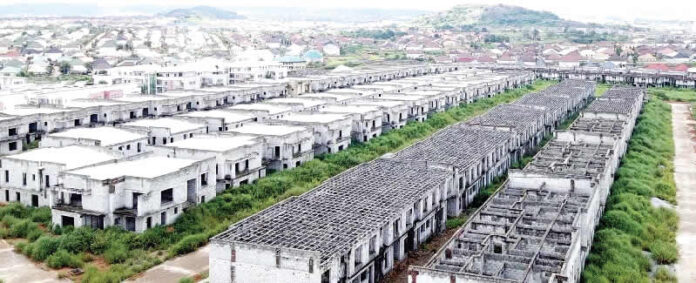The Economic and Financial Crimes Commission (EFCC) has defended its decision not to reveal the identity of the person behind the massive estate it recently seized in Abuja.
The estate, located in the Lokogoma District, comprises 753 duplexes and apartments, making it one of the largest asset recoveries in EFCC’s history.
This recovery, described by the EFCC as “record-breaking,” followed a court order that allowed the agency to take over the property on Plot 109, Cadastral Zone C09.
Despite the celebration of this achievement, some Nigerians expressed disappointment over the agency’s refusal to disclose the name of the estate’s owner.
Sowore Accuses EFCC of Cover-Up
Prominent activist and publisher of Sahara Reporters, Omoyele Sowore, led the criticism.
He accused the EFCC of shielding the estate’s owner, contrasting it with the agency’s frequent practice of publicly naming suspects arrested for internet fraud.
“Why is EFCC silent now? They expose ‘Yahoo boys’ all the time, but they are protecting someone involved in a bigger theft,” Sowore stated.
He suggested that the agency’s silence was a deliberate attempt to cover up the identity of a top government official allegedly linked to the property.
EFCC Responds: Legal Constraints at Play
In a swift response, EFCC spokesperson Dele Oyewale rejected Sowore’s claims, calling them “unacceptable” and “grossly uncharitable.”
Oyewale explained that the forfeiture process followed Section 17 of the Advance Fee Fraud Act, which deals with action against property, not individuals.
“This is a civil proceeding, not a criminal one. The law allows for action-in-rem, meaning the legal action is against the property itself,” Oyewale clarified.
The EFCC argued that revealing the owner’s identity at this stage would have been unprofessional since the title documents did not directly link any individual to the property.
Company Denies Ownership
According to the EFCC, investigations pointed to a company initially suspected to own the estate.
However, the company denied ownership after public notices were issued in major national newspapers.
Following this, the EFCC sought and obtained a final forfeiture order from Justice Jude Onwuegbuzie of the Federal Capital Territory (FCT) High Court.
Ongoing Criminal Investigation
The EFCC emphasized that the criminal aspect of the investigation is still ongoing.
“The substantive criminal investigation continues. We are determined to get to the root of this case,” Oyewale assured.
He reiterated the EFCC’s commitment to its “no-sacred-cow” approach in tackling corruption.
Public Should Focus on Fighting Corruption, Says EFCC
Oyewale urged Nigerians to channel their energy toward addressing systemic issues that enable corruption.
“It’s shocking that instead of commending this landmark achievement, some are focused on casting aspersions,” he said.
He called for collective efforts to close loopholes that allow corruption to thrive.
Critics Demand Transparency
Despite the EFCC’s explanations, critics, including Sowore, maintain that transparency is crucial in the fight against corruption.
They argue that naming the owner would send a strong message about accountability.
“Nigerians deserve to know who is behind this. Transparency is key,” a Lagos-based lawyer remarked.
A Landmark Recovery Amid Growing Scrutiny
The seizure of the estate adds to EFCC’s growing list of high-profile recoveries in recent years.
However, public scrutiny over how the agency handles such cases remains intense.
As the investigation continues, many Nigerians will be watching closely to see if the EFCC eventually reveals the individuals involved.
For now, the agency insists it is bound by legal procedures and will not compromise professionalism for public approval.

